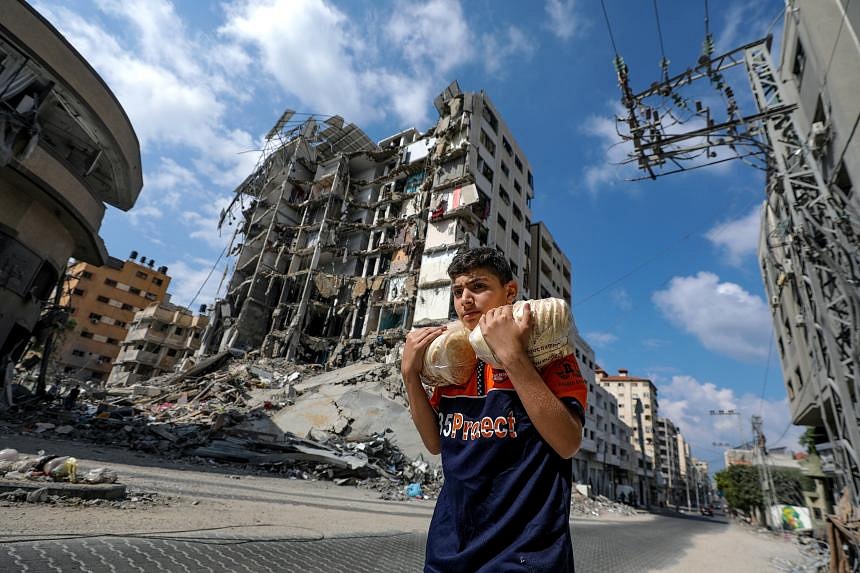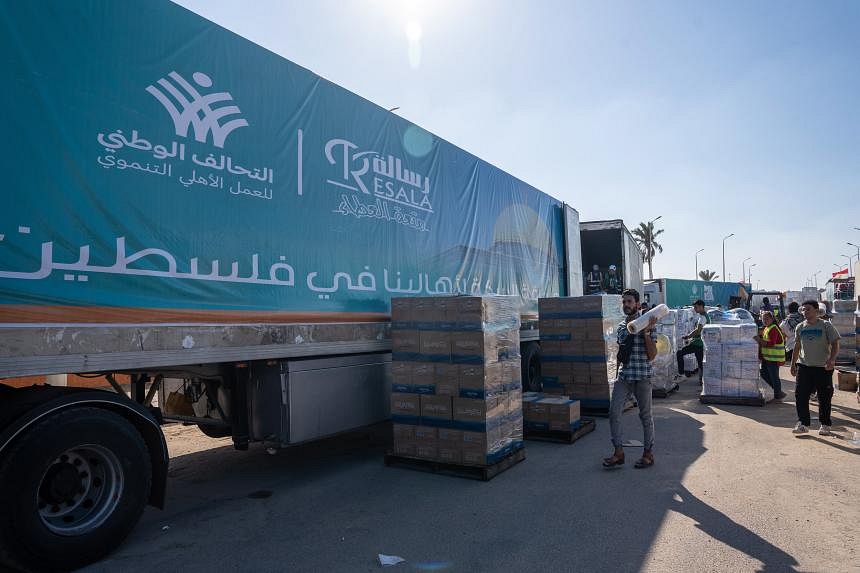GAZA/JERUSALEM/WASHINGTON – Diplomats renewed calls for aid to the besieged Gaza Strip while Iran’s Foreign Minister said Israel would not be allowed to act there without facing consequences, warning of “pre-emptive action” in the coming hours.
United States President Joe Biden will visit Israel on Wednesday, in a trip laden with political and security risks, which were underscored on Monday when US Secretary of State Antony Blinken was forced to shelter in a bunker for five minutes while meeting Israeli Prime Minister Benjamin Netanyahu when sirens went off in Tel Aviv.
Israel has vowed to annihilate the Hamas movement that rules Gaza, after fighters of the armed wing of the Iran-backed Palestinian Hamas movement burst across the barrier to Israel on Oct 7, gunning down 1,300 Israelis, mainly civilians, in the deadliest day in Israel’s 75-year-old history.
Israel has since put Gaza, home to 2.3 million Palestinians, under a total blockade and pounded it with unprecedented air strikes, and is widely expected to launch a ground assault.
The Gaza authorities say more than 2,800 people have been killed there, around a quarter of them children, and more than 10,000 wounded are in hospitals desperately short of supplies.
Hamas said on Monday it had fired a “barrage of missiles”, towards Jerusalem and Tel Aviv.
Iranian Foreign Minister Hossein Amirabdollahian told state TV: “Leaders of the resistance will not allow the Zionist regime to take any action in Gaza… All options are open and we cannot be indifferent to the war crimes committed against the people of Gaza.”
“The resistance front is capable of waging a long-term war with the enemy (Israel)… in the coming hours, we can expect a pre-emptive action by the resistance front,” he added, without elaborating.
Iran, which backs Hamas, refers to regional countries and forces opposed to Israel and the US as a “resistance front”.
Mr Amirabdollahian said it was not limited to Hezbollah in Lebanon and added: “This front was formed throughout the region to preserve the independence of nations and counter repeated aggressions by the Zionist regime over the past years.”
Last week, Iran’s top authority Supreme Leader Ayatollah Ali Khamenei said Tehran was not involved in the Hamas attack on Israel, but hailed what he called Israel’s “irreparable” military and intelligence defeat.
Earlier on Monday, Iranian President Ebrahim Raisi said that while Tehran supported the Palestinian cause, the resistance front against Israel made its own independent decisions.
Diplomatic efforts have concentrated on getting aid into Gaza through the Rafah crossing with Egypt, the sole route out that is not controlled by Israel. Cairo said the Rafah crossing was not officially closed, but was inoperable due to Israeli strikes on the Gaza side.
Mr Netanyahu invited Mr Biden to visit Israel. The US President has been outspoken in his support for Israel, Washington’s closest Middle East ally. The White House declined to comment on any planning for the trip.
National Security Council spokeswoman Adrienne Watson said in a statement that “we have no new travel to announce”.
Such a trip would be a rare and risky choice, showing American backing for Mr Netanyahu as the US tries to avert a broader regional war involving Iran, its Lebanese ally Hezbollah and Syria, and as food and fuel run low in Gaza.
It could, however, grant Mr Biden fresh leverage to influence events on the ground and bolster his image at home.

Mr Biden and Mr Netanyahu, uncomfortable allies in the best of times, have joined forces despite being at odds over the path forward in the Middle East, with the US leader frequently stressing support for independent Israeli and Palestinian states.
A meeting in person would allow Mr Biden to privately discuss concerns and possible red lines in a looming Israeli ground invasion.
A top Hamas leader said on Monday the group “has what it needs” to free all Palestinians in Israel’s jails, indicating the militant group may try to use the Israelis it kidnapped as bargaining chips to secure the release of Palestinian prisoners.
Soon after Hamas official Khaled Meshaal made the remarks on the captives, who include Israelis and non-Israelis kidnapped by Hamas on Oct 7, the group’s armed wing separately said the non-Israelis were “guests” who would be released “when circumstances allow”.
In the biggest sign yet that the war could spread to a new front, Israel ordered the evacuation on Monday of 28 villages in a 2km-deep zone near the Lebanese border.
Israel has said more than a million people in the northern half of Gaza must head to the southern half for their safety, even though Hamas has told them to stay put.
While tens of thousands have fled south, the United Nations says there is no way to move so many people without causing a humanitarian catastrophe.
According to the UN, a million Gazans have already been driven from their homes. Power is out, sanitary water is scarce and the last fuel for hospital emergency generators could be used up within a day.
Mr Netanyahu said Israelis should prepare for a long battle.
“Now we are focused on one target: to unite forces and charge forward to victory. This requires determination because victory will take time,” he told the Israeli Parliament.
“And I have a message for Iran and Hezbollah: Don’t test us in the north. Don’t make the same mistake you once made. Because today the price you will pay will be much heavier.”
The Pentagon has deployed two aircraft carriers – and their flotillas – to the eastern Mediterranean since the attacks on Israel. The ships are meant as a deterrent to ensure the conflict does not expand, but bring a significant amount of power to a region that already hosts a number of US military ships, planes and troops.
Russian President Vladimir Putin told Mr Netanyahu on Monday that Moscow wanted to help prevent a humanitarian disaster in Gaza. The Kremlin readout of the call did not include any mention of the ceasefire Russia was trying to achieve by putting forward a resolution in the UN Security Council.
But Mr Putin briefed Mr Netanyahu on conversations with the leaders of Iran, Egypt, Syria and the Palestinian Authority in which the Kremlin said earlier that this had been discussed.
“A unanimous opinion was expressed on the need for an early ceasefire and the establishment of a humanitarian truce in order to urgently provide assistance to all those in need,” it said of those conversations.

With each day of air strikes, Gazans have been clawing at the rubble of flattened buildings with bare hands to rescue neighbours and recover the dead, with virtually no mechanical equipment to clear away the wreckage.
Those trying to reach the southern border crossing inside Gaza described the route as perilous and under Israeli attack.
“On our way to the crossing, they shelled Rafah Street and we started screaming,” said one resident near the crossing, Hadeel Abu Dahoud. “Nowhere is safe in Gaza. Wherever we go there’s shelling, shelling, crying, screaming, blood.” REUTERS






